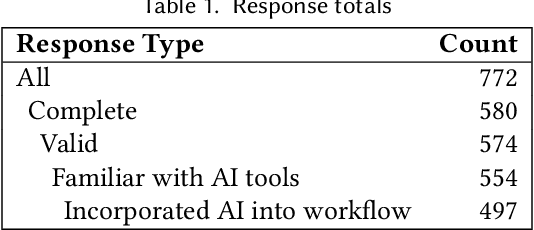Daniel M German
The ML Supply Chain in the Era of Software 2.0: Lessons Learned from Hugging Face
Feb 06, 2025Abstract:The last decade has seen widespread adoption of Machine Learning (ML) components in software systems. This has occurred in nearly every domain, from natural language processing to computer vision. These ML components range from relatively simple neural networks to complex and resource-intensive large language models. However, despite this widespread adoption, little is known about the supply chain relationships that produce these models, which can have implications for compliance and security. In this work, we conduct an extensive analysis of 760,460 models and 175,000 datasets mined from the popular model-sharing site Hugging Face. First, we evaluate the current state of documentation in the Hugging Face supply chain, report real-world examples of shortcomings, and offer actionable suggestions for improvement. Next, we analyze the underlying structure of the extant supply chain. Finally, we explore the current licensing landscape against what was reported in prior work and discuss the unique challenges posed in this domain. Our results motivate multiple research avenues, including the need for better license management for ML models/datasets, better support for model documentation, and automated inconsistency checking and validation. We make our research infrastructure and dataset available to facilitate future research.
Developer Perspectives on Licensing and Copyright Issues Arising from Generative AI for Coding
Nov 16, 2024



Abstract:Generative AI (GenAI) tools have already started to transform software development practices. Despite their utility in tasks such as writing code, the use of these tools raises important legal questions and potential risks, particularly those associated with copyright law. In the midst of this uncertainty, this paper presents a study jointly conducted by software engineering and legal researchers that surveyed 574 GitHub developers who use GenAI tools for development activities. The survey and follow-up interviews probed the developers' opinions on emerging legal issues as well as their perception of copyrightability, ownership of generated code, and related considerations. We also investigate potential developer misconceptions, the impact of GenAI on developers' work, and developers' awareness of licensing/copyright risks. Qualitative and quantitative analysis showed that developers' opinions on copyright issues vary broadly and that many developers are aware of the nuances these legal questions involve. We provide: (1) a survey of 574 developers on the licensing and copyright aspects of GenAI for coding, (2) a snapshot of practitioners' views at a time when GenAI and perceptions of it are rapidly evolving, and (3) an analysis of developers' views, yielding insights and recommendations that can inform future regulatory decisions in this evolving field.
 Add to Chrome
Add to Chrome Add to Firefox
Add to Firefox Add to Edge
Add to Edge